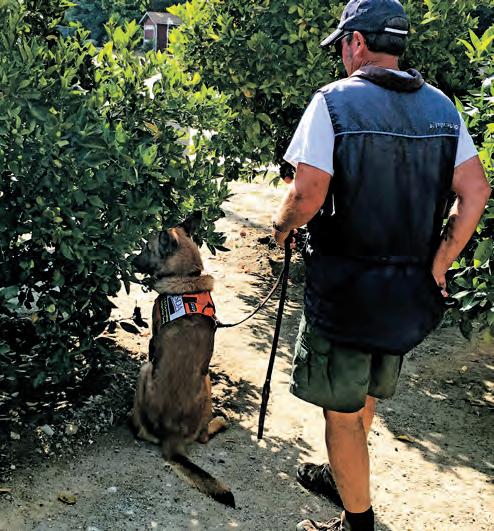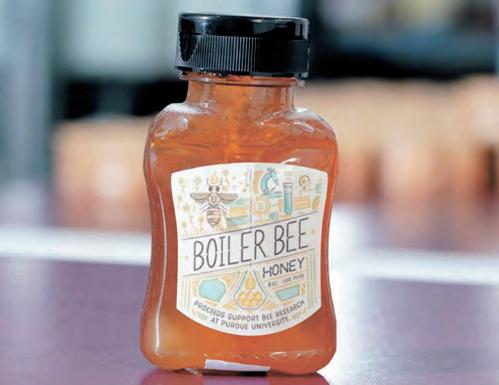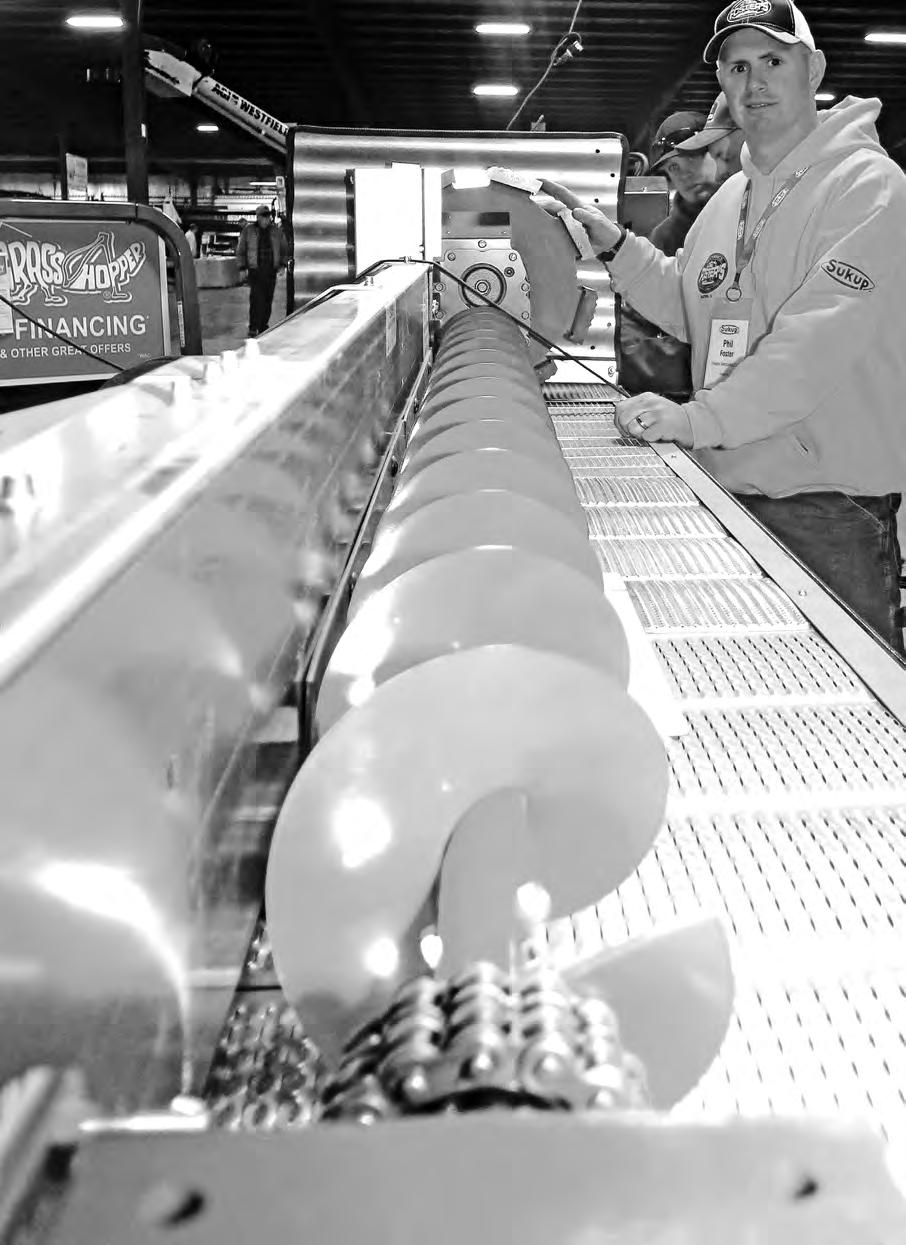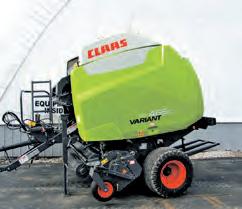
11 minute read
West Fork Whiskey Co
PROVIDED PHOTO President Donald Trump, for the third year in a row, addresses farm and ranch families at the American Farm Bureau Federation’s 101st annual convention in Austin, Texas.
TRUMP FROM PAGE ONE
He also addressed criticism that the largest farms were the primary recipients of the pay ments.
“We’re getting that money, Sonny, to the small farmers, also. There were some statements, big farmers, no, we get them to the small farmers, we get them to everybody, big farmers, small farmers,” said Trump, referenc ing Sonny Perdue, U.S. secretary of agriculture, who traveled with Trump and a handful of Republican federal and state lawmakers to the Farm Bureau convention.
Trump gained a laugh from the audience when he discussed the MFP payment formula.
“We have a formula that, I think, Sonny, has been working very well. If it’s not, call me directly, and I’ll call Sonny and give him hell, OK?” Trump said to laughter from the audience.
The Environmental Protection Agency has been under fire from the U.S. ethanol industry for its handling of small refinery exemp tions or SREs, which allow small oil refineries to not blend ethanol into gasoline due to economic hardship. The Trump EPA has granted over 80 SREs since 2017. “We are proudly promoting American ethanol. I recently approved E15 to be used all year round instead of eight months, and that’s a big thing for the American farmer. We’re pro viding unprecedented support to ethanol, support like you’ve never had before,” Trump said.
He also didn’t miss a chance, in a presidential election year, to criticize his Democratic oppo nents. “The far left, they want to massively raise your taxes, crush your businesses with regulations, take away your health care and send bureaucrats in to interfere with your property and second guess every decision you make,” he said.
Trump gave some indication of his confidence in the 2020 presidential race as he made a promise to the audience.
“This is my third time in a row, and I promise I’ll be here next year, too. We’ll be here next year,” the president said with a smile.
Trump showed why he remains popular among a majority of U.S. farmers and ranchers as he echoed their sentiments to continued and sustained applause and cheers from the Farm Bureau audience.
“There are no better stewards of our precious natural resources than the American farmers who depend on the land and the environment for their very livelihood. You love your land. You’re going to take care of your land. You don’t need some bureaucrat in Washington telling everybody what the hell to do with your land, you love your land. When it comes to the environment, I will always trust a farmer over a Washington bureaucrat or a leftwing extremist,” Trump said.
He also celebrated victories on two of the AFBF’s major issues — the federal estate tax and the Waters of the U.S. rule.
In the Tax Cuts and Jobs Act, that the president signed in December 2017, the federal estate tax exemption doubled, from $5.5 million to $11 million for single filers and from $11 million to $22 million for married couples. That exemption is in effect until 2025.
In September 2019, Trump announced the repeal of the 2015 rule that expanded the definition of “Waters of the United States” as part of the Clean Water Act.
“I terminated one of the most ridiculous regulations of all, the last administration’s disastrous Waters of the United States rule,” said Trump to loud and sustained applause.
Trump echoed some of the AFBF’s concerns over the reach of the expanded WOTUS definition.
“This rule gave bureaucrats virtually unlimited authority to regulate stock tanks, drainage ditches and isolated ponds as navigable waterways and navigable water. Sometimes you’d have a puddle, a little puddle and they considered that a lake,” Trump said.
As he has done twice before at the AFBF annual meeting, Trump finished by celebrating U.S. farmers and ranchers.
“Farmers have always been the keepers of our great American values. You champion the love of family, the dignity of work, and the glory of God. You teach your children to celebrate our nation, defend our freedom, honor our values and to always respect and cherish our great American flag,” said Trump as loud chants of “USA! USA! USA!” broke out along with applause.
“I want to thank everybody. This has been such an incredible turnout, and I appreciate everybody for being here. Thank you all very much, this is a great honor and I’m glad we’ve been successful. We got those deals done,” the president said.
Jeannine Otto can be reached at 815-223-2558, ext. 211, or jotto@agrinews-pubs.com. Follow her on Twitter at: @AgNews_Otto.
AFBF convention mourns passing of Bonnie Duvall
By Jeannine Otto AGRINEWS PUBLICATIONS
AUSTIN, Texas — The annual meeting of the American Farm Bureau Federation was tinged with sadness as members and leaders of the AFBF mourned the passing of Bonnie Duvall, the wife of AFBF President Zippy Duvall.
Bonnie Duvall died at home on Jan. 18 after a battle with ovarian cancer.
“Our hearts are heavy for our good friend and for your president, Zippy Duvall, in losing Bonnie. You know what a pair they were and just fighters to the end,” said U.S. Secretary of Agriculture Sonny Perdue in his address to introduce President Donald Trump.
The president also expressed his sympathy to the Duvall family.
“I want to take a moment to send our love and support to the president of the American Farm Bureau, a great guy, Zippy Duvall. Sadly, Zippy’s wife, a tremendous woman, married for 40 years, Bonnie, passed away last night,” said the pres ident, who spoke to the AFBF members on Jan. 20.
“We want Zippy and his entire family to know that we are keeping them in our thoughts and prayers. It was a very spe
PROVIDED PHOTO Bonnie and Zippy Duvall. The wife of the American Farm Bureau Federation president lost her courageous battle with cancer on Jan. 18.
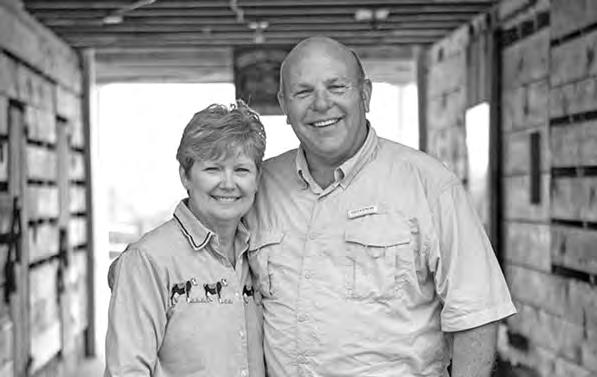
cial relationship, and I just want to wish the family well. Zippy, we are with you 100%,” Trump said.
Scott VanderWal, AFBF vice president, chaired the annual meeting and expressed the AFBF’s sympathies.
“Zippy and Bonnie were partners in every respect for all of their 40 years together. She put her business degree to work keeping the books on their Georgia farm, enabling Zippy to turn his attention to serving his fellow farmers at the county, state and national levels,” VanderWal. said.
“At moments like this our faith consoles us, knowing her soul is at peace, having gone on to our heavenly Father. We will forever be inspired by her sense of humor, love of farming and optimism in the face of adversity. She taught us all what it means to make every moment count,” he said.
Bonnie Duvall is survived by her husband; their children, Lt. Col. Vincent (Erin) Duvall, Cora (Jared) Terry, Zeb (Katie) Duvall and Zellie Duvall; and five grandchildren.
WEST LAFAYETTE, Ind. — What did farmers and those involved in crop agriculture in the Midwest learn from 2019? Nothing new.
“I think we simply relearned a lot of stuff. I don’t think we learned anything absolutely new,” said Bob Nielsen, Purdue Extension corn specialist.
Nielsen offered some thoughts on the 2019 corn growing year in Indiana and the Corn Belt, as well as ideas of how farmers can prepare for similar years ahead.
Some of the primary lessons learned from 2019, according to Nielsen: 1 Late planting does not guarantee low yields. “I’ve been saying this for years. Late planting, by itself, does not guarantee an absolute bad yield. It certainly increases the risk of low yields, but it doesn’t guarantee disaster,” Nielsen said. 2 Modern hybrids are more resilient and capable of handling stress. “There’s no question that the improvements in genetics over the years is what is allowing these crops to handle years like this like they do. It just continues to blow me away at how we can get out of years like this with pretty good yields,” Nielsen said. 3 Soil compaction sticks around. “Soil compaction is the gift that keeps on giving. We had an undoubtedly wet spring, a lot of wet tillage, a lot of soil compaction created with that and we all planted because we were trying to get this crop in the field. We planted on the wet side. It’s a gift that keeps on giving because when that dry spell set in, the fields that began to show drought symptoms first were, indeed, the fields that had the worst degree of soil compaction and that is the curse of soil compaction,” Nielsen said. 4 Moisture during grainfill is important. “Here at the farm and much of this area of the state, even that Nielsen lack of rainfall in August and September, that really took a toll on yield,” Nielsen said. 5 Late-maturing corn is slow to dry down. “We don’t expect a lot of drydown in mid to late October any year. We had so much of our crop maturing in early to mid October, and it seemed to take forever and a year. We were surprised by it for some reason, but we never dry very fast in October, let alone in November,” Nielsen said.
THE NEW NORMAL
Speaking to an audience at the Purdue Top Farmer Conference at the Beck Agricultural Center, Nielsen said farmers need to adjust to a new normal of unpredictability.
“Normal weather today can be defined as an unpredictable number of unpredictable extreme weather events each occurring unpredictably with unpredictable severity,” said Nielsen, adding that those events range from torrential and sudden rains to latent drought to sudden and sustained cold spells.
“How do we stress proof crops to avoid things we can’t predict?” Nielsen said.
Nielsen said some answers include the continuation of seed companies to improve resiliency of hybrids along with yield potential.
It also means that farmers may need to delve deeper into the details of their hybrid selection.
“It also reinforces the im portance for us to do an even better job of choosing hybrids that we want to grow by not just focusing on yield, but really asking hard questions of a seed dealer. Prove to me that this hybrid is stress tolerant,” Nielsen said.
With no control over the weather, farmers can focus on everything they can control and determining those factors field by field.
“It’s even more crucial that any agronomic decision you have control over, you make the best choice you can make, the best decision you can make. Sort of related to that is the importance of identifying and taking care of yield limiting factors on a field-by-field basis,” Nielsen said.
OPIOIDS FROM PAGE ONE
“So, a patient comes in the emergency room, we check their blood pressure, heart rate, oxygen, temperature, respirations. Now, we’ve got to add pain to that.
“Well, if you come in with high blood pressure, I’m going to see that. I’m obligated to treat your high blood pressure. If you come in with low oxygen or fast respirations, I’m obligated to treat that as a medical professional morally and ethically. You come in now with the pain scale, you’ve got a cough and your say, ‘I’m hurting like a 10.’ I’ve got to do something for that, right? Now, I’ve got this first-line treatment of OxyContin that’s supposed to be non-addictive anyway, so why not just give him this OxyContin?”
As patients became addicted, they quickly learned how to abuse the system, Niswander said.
“These people figured this game out really quick,” he said. “They come in, ‘Hey, I stubbed my toe. Boy, it’s like a 10.” Well, it ain’t broken. You know, it’s not even red. I don’t even see where you hit it. ‘It’s killing me. It’s killing me.’ So, we’ve got to do something about it. We fix people. Medical professionals fix people, and if there’s a resource to fix it, we give it to them.”
A lot of towns and small communities, where farmers get hurt, lack mental health resources, Niswander lamented. “Let’s face it, farming is hard. Economically, financially, it’s tough,” he said. “You can get depressed. You can get anxious about it. And if somebody doesn’t have a good support system, or already has some mental health issues underlying, opioids give you that euphoric feeling. ‘I just lost $100,000, but I feel pretty good, though, let’s keep trucking. That cow just ran me over, but I feel pretty good.’ That’s really what they do.” Niswander emphasized any one can become addicted to opioids that are prescribed legally for a legitimate injury. It only takes three days to become addicted and for your body to crave the euphoria that opioids produce, he said.
WHAT DO WE DO NOW?
If you suspect opioid abuse, try to have an honest conversation with that person, even though it can be uncomfortable, Niswander advised.
Do not get angry, or offended. Be calm and clear about what you ask and say, know when to stop the conversation and talk about it later and make sure the person knows you love them no matter what.
Niswander also recommended having Narcan medication on hand. Narcan, “the antagonist for opioids,” is the reversal medication for someone who has overdosed on opioids and is very easy to administer by nasal spray, he said.
In Indiana, it can be ob tained for free by attending a one-hour training session at the county health department. Forty-nine Hoosier counties have already utilized the program, giving out 13,721 kits, Niswander said.
American Farm Bureau Federation and National Farmers Union joined forces to launch the “Farm Town Strong” campaign to raise awareness of the opioid crisis’ impact on farming communities.
A website — FarmTownStrong. org — provides easy access to information and resources that can help struggling farm families and rural communities.
Niswander also successfully lobbied for a resolution at the recent AFBF Convention to support a national prescription drug database, allowing physicians to track narcotic prescriptions, even across state lines, and combat drug misuse and unintentional overdose.





